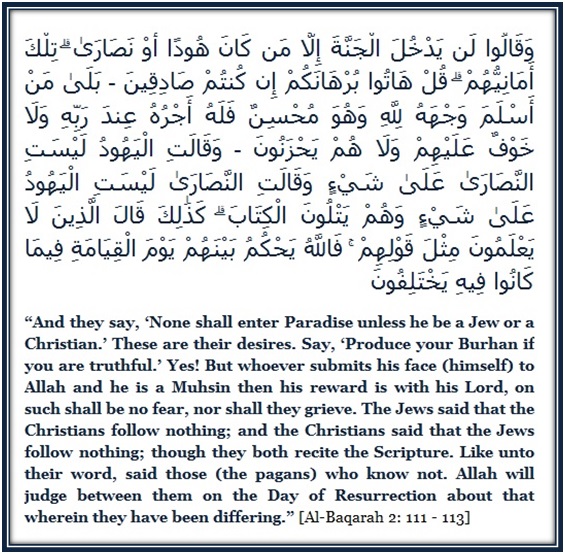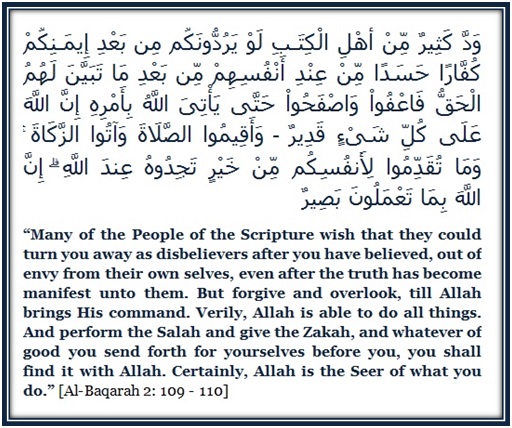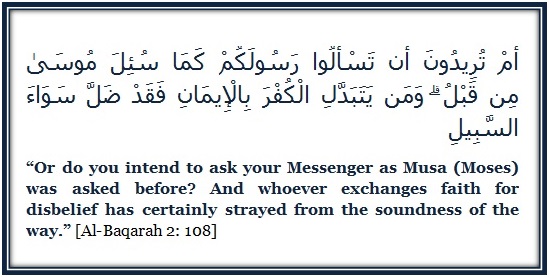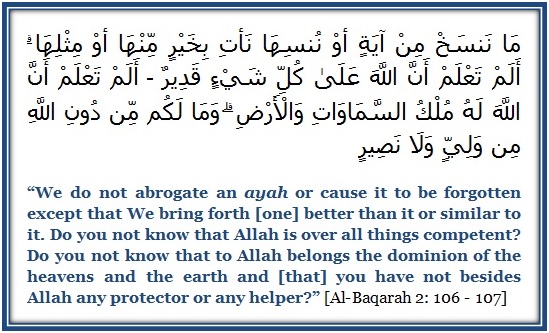Abandoning the Book of Allah and practicing Magic
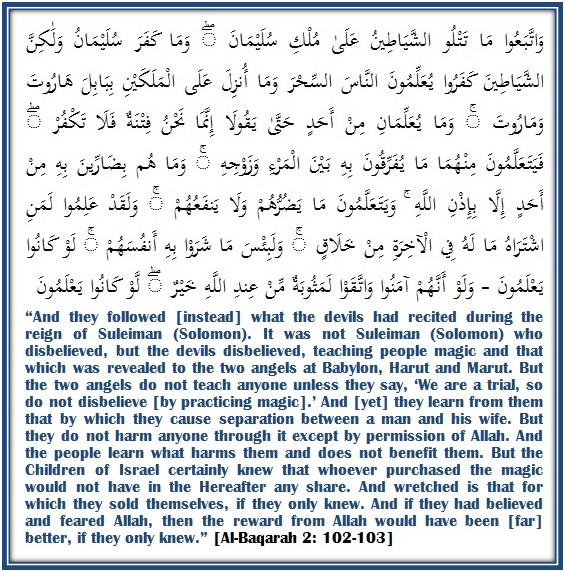 |
| Surah Baqarah Verse 102-103 |
Before the revelation of the Qur’an, the devils used to ascend to heaven and eavesdrop on the conversations of the angels about what will occur on the earth regarding death, other incidents or unseen matters.
They would convey this news to the soothsayers, and the soothsayers would in turn convey the news to the people. The people would believe what the soothsayers told them as being true. When the soothsayers trusted the devils, the devils started to lie to them and added other words to the true news that they heard, to the extent of adding seventy false words to each true word. The people recorded these words in some books. Soon after, the Children of Israel said that the Jinns know matters of the Unseen.
When Suleiman (Solomon) ‘alayhi salaam was sent as a prophet, he collected these books in a box and buried it under his throne; any devil that dared getting near the box was burned. Suleiman ‘alayhi salaam said, “I will not hear of anyone who says that the devils know the Unseen, but I will cut off his head.” When Suleiman ‘alayhi salaam died and the scholars who knew the truth about him perished, there came another generation. To them, the devil materialized in the shape of a human and said to some of the Children of Israel, “Should I lead you to a treasure that you will never be able to use up?” They said, “Yes!” He said, “Dig under this throne,” and he went with them and showed them Prophet Suleiman’s throne. They said to him, “Come closer.” He said, “No. I will wait for you here, and if you do not find the treasure then kill me.” They dug and found the buried books, and Satan said to them, “Suleiman only controlled the humans, devils and birds with this magic.” Thereafter, the news that Suleiman ‘alayhi salaam was a sorcerer spread among the people, and the Children of Israel adopted these books. When Muhammad salAllahu ‘alayhi wa sallam came, they disputed with him relying on these books, hence Allah subhanahu wa ta’ala defended His Prophet (as He protects His friends) and said, “It was not Suleiman (Solomon) who disbelieved, but the devils disbelieved.”
The Story of Harut and Marut – the Two Angels sent as a Trial
Allah subhanahu wa ta’ala says, “…and that which revealed to the two angels at Babylon, Harut and Marut. But the two angels do not teach anyone unless they say, ‘We are a trial, so do not disbelieve [by practicing magic].’ And [yet] they learn from them that by which they cause separation between man and his wife.”
There is a difference of opinion regarding this story. It was said that this ayah denies that anything was sent down to the two angels, as Al-Qurtubi stated. He then referred to the ayah, “It was not Suleiman who disbelieved,” and said that the negation applies in both cases.
The Jews claimed that Jibreel (Gabriel) and Mika’el (Micheal) brought magic down to the two angels, Allah subhanahu wa ta’ala refutes this claim. Ibn ‘Abbas radhiAllahu ‘anhu has been reported to have said, “Allah did not send magic down.”
Mufti Muhammad Shafi ‘Usmani writes in his tafseer (Maarif-ul-Qur’an):
There was a time when black magic had grown popular in the world, particularly in Babylon. Seeing its astonishing efficacy, ignorant people began to confuse its effects with the miracles of the prophets, and to suppose that the two were identical in nature. Some even looked upon magicians as being holy men, and worthy of being obeyed; still others actually started learning and practicing black magic as if it were a good deed bearing a divine sanction.
This extraordinary veneration for magic and magicians had become a potent source of misguidance. In order to eradicate this misunderstanding, Allah subhanahu wa ta’ala sent down two angels Harut and Marut. The angels informed the people the true nature of magic and its different forms, so that they should distinguish it from the miracles of prophets, and keep away from obeying magicians and practicing magic themselves. Just as the prophethood is divinely confirmed through miracles, signs and rational or other arguments, in the same way the angelical nature of Harut and Marut was confirmed on the basis of different signs and arguments, so that people should listen to them attentively and follow their guidance.
In short, the two angels came down to Babylon, and started the work assigned to them. They explained the basic principles of magic, its different forms and the specific formulas, and then dissuaded the people from involving in these activities or with the magicians.
All sorts of people started coming to the angels for seeking information about the nature and the specific formulas of a magic lest ignorance should lead them into error. In order to provide the correct teaching on this subject and to protect the people from error, the angels were scrupulous enough to make it a point to warn them of possible dangers in giving them the information. They insisted on making it quite clear that in allowing them to provide this kind of information to the people, Allah subhanahu wa ta’ala intended to put His servants through a trial. He would see who uses this knowledge for protecting his emaan (faith) by recognizing evil and avoiding it, and who falls into misguidance by adopting evil that he has come to recognize as evil – a choice which can easily lead one to Kufr (disbelief).
The angels repeatedly advised to seek this dangerous information only with a good intent and to remain steadfast in this good intent, and not to misuse the knowledge to earn perpetual damnation.
Learning Magic is Kufr (Disbelief)
In the ayah Allah subhanahu wa ta’ala says, “But the two angels do not teach anyone unless they say, ‘We are a trial, so do not disbelieve [by practicing magic].”
Ibn ‘Abbas radhiAllahu ‘anhu said, “When someone came to the angels to learn magic, they would discourage him and say to him, ‘We are only a test, so do not fall into disbelief.’ They had knowledge of what is good and evil and what constitutes belief or disbelief, and they thus knew that magic is a form of disbelief. When the person who came to learn magic still insisted on learning it, they commanded him to go to such and such place, where if he went, Satan would meet him and teach him magic. When this man would learn magic, the light (of faith) would depart him, and he would see it shining (and flying away) in the sky. He would then proclaim, ‘O my sorrow! Woe unto me! What should I do?’”
Hasan Al-Basri said that this ayah means, “The angels were sent with magic, so that the people whom Allah subhanahu wa ta’ala willed would be tried and tested. Allah subhanahu wa ta’ala made them promise that they would not teach anyone until first proclaiming, ‘We are a test for you, do not fall into disbelief.’”
Commenting on this ayah Ibn Jurayj said, “No one dares practice magic except a disbeliever. As for the Fitnah, it involves trials and freedom of choice.”
The scholars who stated that learning magic is disbelief relied on this ayah for evidence. They also mentioned the hadeeth that Abu Bakr Al-Bazzar recorded from ‘Abdullah, which states,
مَنْ أَتَى كَاهِنًا أَوْ سَاحِرًا فَصَدَّقَهُ بِمَا يَقُولُ فَقَدْ كَفَر بِمَا أُنْزِلَ عَلى مُحَمَّدٍصلى الله عليه وسلّم
“Whoever came to a soothsayer or a sorcerer and believed in what he said, will have disbelieved in what Allah revealed to Muhammad.”
Causing Separation between the Spouses is a Shaytanic Act
Allah subhanahu wa ta’ala says, “…and yet, they learn from them that by which they cause separation between a man and his wife…” The people learned magic from Harut and Marut and indulged in evil acts that included separating spouses, even though spouses are close to, and intimately associate with each other. This is the devil’s work.
Muslim recorded that Jabir bin ‘Abdullah said that the Messenger of Allah salAllahu ‘alayhi wa sallam said,
إِنَّ الشَّيْطَانَ لَيَضَعُ عَرْشَهُ عَلَى الْمَاءِ ثُمَّ يَبْعَثُ سَرَايَاهُ فِي النَّاسِ فَأَقْرَبُهُمْ عِنْدَهُ مَنْزِلَةً أَعْظَمُهُمْ عِنْدَهُ فِتْنَةً وَيَجِيءُ أَحَدُهُمْ فَيَقُولُ: مَا زِلْتُ بِفُلَانٍ حَتَّى تَرَكْتُهُ وَهُوَ يَقُولُ كَذَا وَكَذَا، فَيَقُولُ إِبْلِيسُ: لَا وَاللهِ مَا صَنَعْتَ شَيْئًا، وَيَجِيءُ أَحَدُهُمْ فَيَقُولُ: مَا تَرَكْتُهُ حَتّى فَرَّقْتُ بَيْنَهُ وَبَيْنَ أَهْلِهِ، قَالَ: فَيُقرِّبُهُ وَيُدْنِيهِ وَيَلْتَزِمُهُ وَيَقُولُ: نِعْمَ أَنْت
“Satan erects his throne on water and sends his emissaries among the people. The closest person to him is the person who causes the most Fitnah. One of them (a devil) would come to him and would say, ‘I kept inciting so-and-so, until he said such and such words.’ Iblees says, ‘No, by Allah, you have not done much.’ Another devil would come to him and would say, ‘I kept inciting so-and-so, until I separated between him and his wife.’ Satan would draw him closer and embrace him, saying, ‘Yes, you did well.’”
Separation between a man and his wife occurs here because each spouse imagines that the other spouse is ugly or ill-mannered, etc.
LESSON:
Causing separation between the spouses is a devilish act. Parents and parents-in-laws who provoke their children to usurp the rights of their spouse; create misunderstanding; and do not let the couple live a peaceful and pleasant life should fear Allah subhanahu wa ta’ala. If you have married your children, consider them adults and stop interfering in their lives. Families should neither ask the couple their private talk nor should the spouses reveal their secrets. A couple should live as clothing which being close beautifies the person and conceals its faults.
May Allah subhanahu wa ta’ala guide us and bless the spouses marital love and bliss, ameen.
Allah’s Appointed Term Supersedes Everything
Allah subhanahu wa ta’ala says, “But they do not harm anyone through it except by permission of Allah.” Mufti Muhammad Shafi ‘Usmani writes that this shows us that causes in themselves and by themselves cannot produce the effects one usually associates with them. It is Allah subhanahu wa ta’ala who creates the effects as much as the causes.
Allah subhanahu wa ta’ala allows magicians to adversely affect whomever He wills and saves whomever He wills from them. Sorcerers never bring harm to anyone except by Allah’s leave.
LESSON:
When someone is tested in their life, they blame it on their relatives or anyone who ‘they think’ is their enemy. In the ayah, Allah subhanahu wa ta’ala informs us that nobody can harm us unless He wills that we be harmed. Why would He will that we be harmed? It is to test us and to see our reaction. What words come out of our mouth? What opinion we hold about others? How impure our hearts and minds are (that we will think ill of someone)? It is also because of our own doing. Perhaps, we have distanced from Allah subhanahu wa ta’ala? Perhaps, we are not vigilant about our personal hygiene and keeping our houses clean? Know that the Shayateen live in dirty places. If you wish to keep the Shayateen away don’t miss your daily recitation of the Qur’an; recite Surah Al-Baqarah every three days or play it on a player (and listen to it attentively), recite your words of remembrance and the supplications for protection, especially Surah Al-Falaq and An-Nas. Seek refuge with Allah subhanahu wa ta’ala from the inciting of the devil. Remember that if you maintain good ties with Allah subhanahu wa ta’ala, then He will not let you go.
May Allah subhanahu wa ta’ala protect us all, ameen.
“And the people learn what harms them and does not benefit them,” learning magic harms one’s religion and brings no benefit compared to the harm that it causes. Those who engage in magic will have no share in the Hereafter. This should alarm us and we should see where we are putting our energies.
If one has been afflicted by magic then they should only approach authentic scholars and avoid going to quacks, peers and sorcerer.
“And wretched is that for which they sold themselves, if they only knew,” they preferred magic over faith and following the Messenger. Had they believed in Allah subhanahu wa ta’ala and His Messenger and avoided the prohibitions, then Allah’s reward for these good deeds would have been better for them than what they chose and preferred for themselves.
